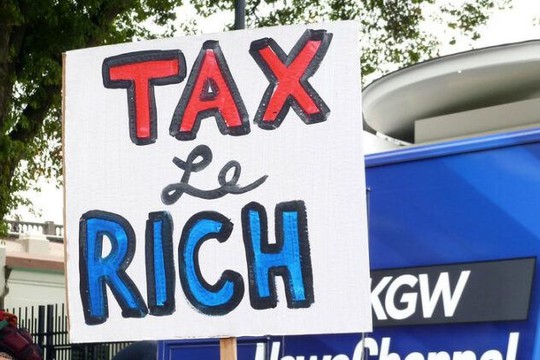“The UK is splitting apart,” a New Statesman analysis last month would agree, “fueled by a tax system that entrenches inequality.” The United States, in the meantime, faces the same split and a similar inequality-entrenching tax system, notes Sam Pizzigati from the Washington Institute for Policy Studies.
Eight decades ago, at a pivotal turning point in American history, our nation’s richest faced a 94 percent federal tax rate on their income over $200,000, the equivalent of about $3.5 million today. At that point, near the end of World War II, only one other nation — the UK — taxed its rich at a steeper rate. The wealthiest Brits ended the war facing a 97.5 percent tax on their top-bracket income.
These stiff top tax rates — all nearly unimaginable today — would help usher in a generation of unparalleled economic progress for average Americans and Brits. And those rates ebbed only slightly in the postwar years. In the 1950s, America’s richest faced a 91 percent top tax rate. The GOP president then sitting in the White House, Dwight Eisenhower, made no move whatsoever to hack that top rate down.
Overall, notes the economist Thomas Piketty, America’s wealthiest faced an average 81 percent top tax rate between the years 1932 and 1980, one key reason why our richest 0.1 percenters — over the course of the 20th century’s middle decades — saw their share of the nation’s wealth sink from 25 to just 7 percent.
The rich — on both sides of the Atlantic — would spend plenty of time stewing about that shocking sink throughout those middle decades. But these deep pockets would eventually regain their political mojo, first in the UK with Margaret Thatcher’s 1979 political ascent and then a year later with Ronald Reagan’s election. By 1988, the UK’s top rate had sunk by over half, and America’s richest faced just a 28 percent top-bracket bite.
But none of this tax cutting — back then and ever since — has brought us the nirvana that the Thatcherites and Reaganites promised. We’ve experienced no uplifting trickle-down. We have, instead, witnessed an incredibly intense concentration of wealth that has recreated the same sort of top-heavy economic imbalances that ushered in the Great Depression almost a century ago.
The Labour Party’s prime-minister-in-waiting Keir Starmer last September pledged to undo the ruling Conservative Party’s axing of Britain’s 45 percent top-bracket tax. “I would reverse it — be absolutely clear about that,” Starmer told the BBC.
The UK Conservative Party’s tax giveaways to the rich, Starmer would add at the Labour Party’s annual conference last fall, rested on the “wrong headed” argument that “if you allow the rich to get richer, somehow that money will trickle down into the pockets of all the rest of us.”
But Starmer has changed his tune over recent months. In June, Starmer openly backpedaled on his commitment to press for a higher tax rate on top incomes if Labour triumphs, as polls now predict, in Britain’s next elections.
But that economy’s growth, the British labor movement detailed last month, is enriching only the already rich. The UK, says Trades Union Congress general secretary Paul Nowak, now needs “ to start a national conversation about how we tax wealth in this country.”
That conversation appears to be exactly what the Labour Party’s current leadership seems intent on quashing. Britain’s 50 richest families, notes the University of Sheffield’s Prem Sikka, hold more wealth than the entire bottom 50 percent of the nation’s population. Yet the Labour leadership, he points out, will not consider broadening “the tax base by levying a wealth tax.”
read more in our Telegram-channel https://t.me/The_International_Affairs

 12:05 11.09.2023 •
12:05 11.09.2023 •























